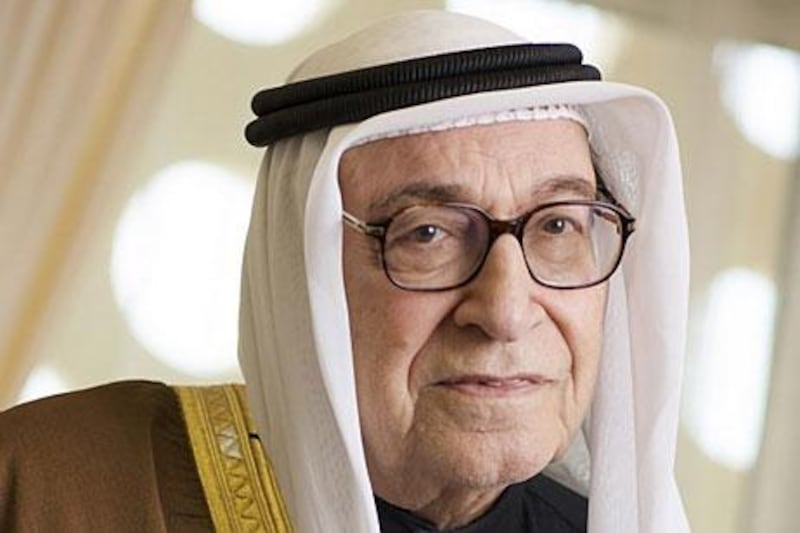As the chairman and executive officer of the conglomerate Yousuf Bin Ahmad (YBA) Kanoo Group of Bahrain, Abdullah Ali Kanoo, who has died aged 83, was a highly influential businessman and philanthropist who both witnessed and contributed to the extraordinary development of his country.
The family business had humble beginnings. In the late 19th century Abdullah's great uncle, Hajji Yusuf bin Ahmed, began importing goods from India on a small scale. He also built good relationships with the British, serving in an unofficial capacity as an interpreter and intermediary between their political agents and the ruler of Bahrain and acting as the representative of the Anglo-Persian Oil Company and the Mogul steamship line. A hundred years later, the Kanoo Group boasts a wide spectrum of interests including shipping, travel, machinery, oil and gas, power and industrial projects.
Born during the Depression, Abdullah was brought up in an austere family environment in which being conservative was not merely a choice, but a fact of life. From an early age he learned the value of hard work and tenacity, and for the rest of his life was preoccupied by business 365 days a year, seldom taking a holiday.
In the 1940s, the elder of Abdullah's two brothers, Ahmed, scored the company's first international success in the wake of World War II when he travelled to England by flying-boat and signed a deal to import white refined sugar to the Gulf.
At the time, Abdullah was newly returned to Manama, following his studies at the American University of Beirut. Under the tutelage of Ahmed, he learned the various procedures involved in handling cargo and clearing goods through customs. As business grew - with the addition of several barges and tugs to the company's fleet purchased from London's River Thames authority - and with the completion of Abdullah's "apprenticeship", he was assigned the task of establishing a YBA Kanoo presence in Saudi Arabia.
His first experience of the kingdom proved somewhat chastening. Beirut had charmed with its cosmopolitanism, and Bahrain was comfortable because it was home. Saudi Arabia, in contrast, was still undeveloped, the landscape harsh and the life hard. Abdullah lasted a year before asking his cousin, Mohammad, if he could return to Bahrain. His request was granted: he was told he would be given somewhere to live and a salary. He would not, however, be allowed to continue working within the Kanoo Group.
Given time to reflect, Abdullah decided instead to return to Saudi Arabia. It was a wise move, as opportunities to further the family's business interests increased exponentially during the 1960s and '70s; it was a time, he said, when even donkeys made money. As much for his contribution to the fortunes of Bahrain, Abdullah Kanoo will be remembered for the significant role he played in helping grow the private sector of Saudi Arabia's Eastern Province.
Circumstances, while not always obviously encouraging, could usually be turned to some advantage. In August 1990, when Saddam Hussein drove his forces into Kuwait, operations at YBA Kanoo in Dammam, where Abdullah was based, continued as normal. Despite the fear that Iraqi troops could reach the oilfields and refineries of Saudi Arabia in hours if unchecked, Abdullah was adamant that this was a Kuwaiti affair and that the office should continue to trade.
Indeed, the Kanoo Group profited from the invasion: its first department store, Zaina International, a venture with the US-based Sears Roebuck, opened the same month. Rather than denting sales, the invasion improved them. The American troops sent to the Gulf to counter Saddam's aggression found that Zaina met their needs perfectly. They would arrive armed with shopping lists and receive their desired goods within 48 hours.
Up until the time of his death, Abdullah was closely involved with the workings of the business. Although confined to a wheelchair and too infirm to speak, he had attended the inauguration of the Kanoo Terminal Services' high-tech inland container depot in Dammam last Saturday, the day before his death.
Renowned for his philanthropic interests and revered for his compassion, among many other projects he helped fund the foundation of a 52-bed kidney dialysis centre in Muharraq, Bahrain.
Aside from his duties at the Kanoo Group, he also served as the chairman of the National Bank of Bahrain.
He is survived by his wife, Mariam, two sons, Ali and Ahmed, and three daughters, Lamya, Hana and Safia.
Born 1927. Died October 10, 2010.





